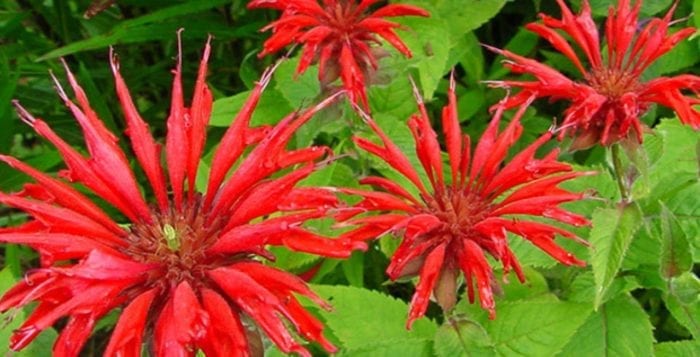Long Island Gardening: Plants that mosquitoes hate — and gardeners love
By Ellen Barcel
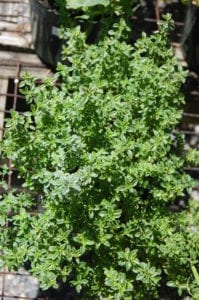
Before the invention of the bug zapper and the mosquito lures, people relied on plants, such as citronella, to keep mosquitoes away. Personally, I hate bug zappers and mosquito lures not only use electricity but have to be emptied of dead bugs.
So, why not return to more natural ways of keeping mosquitoes away? Why not surround your porch, patio or deck with pots of beautiful plants that are known to repel the little buggers? Why not spread them around to keep the yard mosquito free? Many are actually plants you are growing already but need strategic placement to be the most effective. One of the interesting aspects of mosquito control is that many of the plants mosquitoes hate due to their scent are ones people just love. As a bonus, many are hardy in our area; so plant once and they return year after year.
Citronella grass
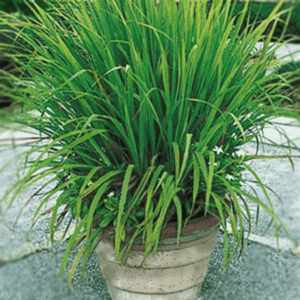
Let’s start with citronella. Citronella grass (Cymbopogon nardus and C. winteriannus) is used as an herb in Asian cooking but is best known in our area as a mosquito repellent. Citronella grass forms clumps and can get quite tall, up to 6 feet tall. The plant is a perennial in U.S.D.A. zones 10 to 12 (Long Island is zone 7). So, yes, you would need to replant it each year. Make sure you give this plant sufficient water, possibly daily depending on how much rain we get. Do not confuse this with citronella-scented geraniums or other plants with a citronella scent as they have not been proven to repel mosquitoes. To be effective break off a blade of grass and rub it on your clothing.
Monarda
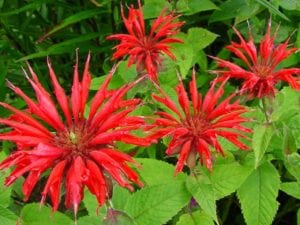
Monarda (bee balm) is in the mint family and native to North America. It is sometimes grown for its flowers, which come in shades of pink, red and purple, but is also an insect repellent. The plant was used medicinally by Native Americans for a number of problems including as an antiseptic and as a seasoning for wild game. But, its scent is what repels mosquitoes. Crush the leaves to release the oil. Like so many flowering plants, it prefers a sunny location and well-drained soil. It does well in acidic soil, generally in the range of 6.0 to 7. If yours is substantially below that, you may need to add lime. It’s hardy in our area and reaches a height of 2 to 3 feet tall.
Marigolds
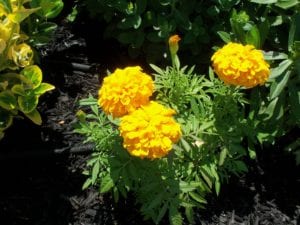
Marigold is another beautiful plant that repels mosquitoes. Marigolds traditionally come in shades of yellow and orange. When I was a kid, I remember the Burpee seed company having a contest for the first grower who could produce a true white marigold. And yes, the prize was awarded in 1975. ‘Snowdrift,’ ‘Snowman’ and ‘Snowball’ are three of the white cultivars. ‘French Vanilla Hybrid’ has flowers up to 3 inches across.
Marigolds (Tagetes) are in the sunflower family. While native to the Americas, they have become naturalized in many other areas of the world. African and French marigolds are cultivars of the American ones. They don’t have the best scent to humans, but, since mosquitoes hate them and they bloom late spring, summer and into fall, they are well worth planting. They come in a variety of blossom shapes and sizes. Since they bloom about six weeks after germinating, it’s best to start them indoors or buy plants from the nursery. Some gardeners who use companion planting will put marigolds among their veggies to keep insects away.
Lavender
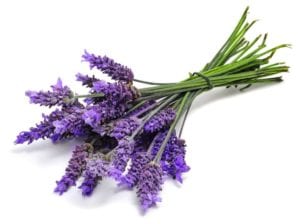
Another beautiful mosquito repellent is lavender. There are approximately four dozen species of flowering plants known as lavender, which are in the mint family — check out the square stems. While used extensively as an ornamental for its beautiful purple flowers, it is also grown for its oils, which are used in a wide variety of scented products, such as soaps, hand creams, perfumes and other cosmetics. One of the nice things about lavender is that it prefers dry, sandy soil. So, for many Long Island gardeners that’s a big plus. Like most herbs, it prefers a sunny location. Besides being a natural mosquito repellent, it can also be used in salad dressings and even baked goods. This one is a definite plus in the garden for many reasons.
Lemon-scented plants
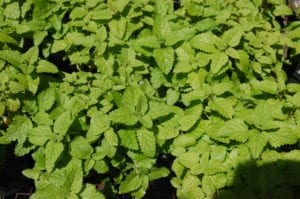
Lemon-scented plants such as lemon geraniums (Pelargonium crispum), lemon balm (Melissa officinalis), lemon grass (Cymbopogon citratus), lemon thyme (Thymus vulgaris × citriodus) and lemon verbena (Aloysia triphylla) are very effective as mosquito repellents as well. Other plants that seem to repel mosquitoes include artemesia, ageratum, cedars, rosemary, catnip (but it does attract cats), garlic, most mints in general, woodruff and basil.
Ellen Barcel is a freelance writer and master gardener. To reach Cornell Cooperative Extension and its Master Gardener program, call 631-727-7850.

